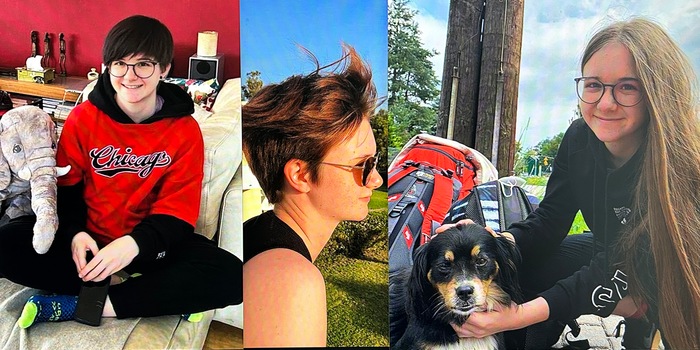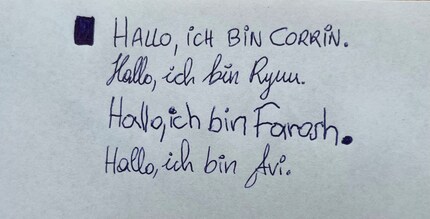
Background information
One body, twelve personalities: Avis lives with dissociative identity disorder (part 1)
by Maike Schuldt-Jensen

Avis isn’t alone in her body. If you read the first part of the interview you’ll know why and with whom she shares her body. Here, she talks about how the roommates in her head work together, what the internal world is, and why she wants to educate others about her condition.
There are quite a few of us. That could be the conclusion from the first conversation with Avis. The Vienna-born Avis reported on the individual characters of her DID system and how her personality disorder and the psychiatric clinical picture came about.
I want to find out more. For example, how the twelve alters decide which of them will take control next. Avis explains that she can’t ask for a specific person and have them deliberately front. However through various triggers, certain alters can be elicited. For example, through their favourite music. Or general things that the person likes. For Farosh, for example, that’s cuddly toys. But there are also negative triggers. That’s why, the confident Corrin comes out when the DID system is in an uncomfortable or dangerous situation and is harassed in public, for example. Corrin protects himself and the others by fronting and fighting back. Something that would overwhelm shy personalities like Bella or Avis and send them into shock. «So, the different personalities can sort of apply themselves to the DID system as needed?», I inquire. «Exactly», Avis answers:
«We work together. Each alter has their strengths and the brain automatically selects the one who was created for that particular reason.»
So the alters linked to trauma come out in traumatic situations, and alters that are there to protect the body front in situations where the body’s threatened. «Other alters, which may be empathic or sociable in disposition, come to the fore in social situations.» The brain mostly does this automatically.
Spontaneous changes can sometimes be impractical. Avis tells me a few anecdotes from her school days. For example, that she has no memory of her graduation ceremony, as another alter experienced it. Corrin, for example, once wished he could go to Disneyland. However, he wasn’t present at the excursion itself – and thus has no recollection of it. He did take the helm once in a Latin exam at school though. This was very inconvenient, since it was mainly Ryuu who had been present in the previous Latin lessons. So now Corrin was looking over the tasks that he couldn’t solve because he didn’t know anything about the school material. At the time Avis’ dissociative identity disorder hadn’t been diagnosed. But the effects were already causing difficulties. Not only in situations when she couldn’t recall her knowledge: «For example, our handwriting kept changing. So some teachers accused us of cheating or getting someone else to do our homework for us.»

I admit, I wasn’t aware such problems existed. It’s as if Avis has several students in her head. She has to cram the subject matter with them one at a time, if she wants to even get close to passing the exam. «Exactly that’s a very big problem for us,» she confirms. «It actually happens time and again that an alter who doesn’t know the subject comes out at an exam – just because it’s a stressful situation for us. This means we actually need, double, three times or four times the amount of preparation time.»
So it’s not just a shared apartment in Avis’ mind, but also a school class. And, as you already know, a very diverse one too. Indeed, a female body can also split off into male personalities. «How does that happen?», I ask Avis. That’s because the brain really doesn’t care about gender, the 20-year-old explains. It’s all about giving the child what they need – usually security. That can be by a strong protector or a maternal figure. Or even characters from movies and books that accompany you during the traumatic time can take on this role, according to Avis. For example, the alter Holly is fictional and based on the character with the same name in the Woodwalkers book series. Such role models don’t even have to be human:
«The brain has no limits, only the child’s imagination is the limit of what alters can be. Even fairies or other fantasy creatures can emerge.»
When I ask Avis about non-human alters, she tells me that some of her personalities sometimes present themselves as dragons. «Probably because dragons embody strength, courage and power and because they can fly away and be free. And that’s obviously not what we had as a child.» For example, in the internal world, Corrin shows up as one of these powerful fantasy beings.
By the way, Avis doesn’t hear a permanent racket of voices from twelve people. The people who are in the internal world are shielded. But alters which are close to front or present in the background may throw out individual comments. Or – somewhat less frequently and only if the connection between the two alters is good – enter into a dialogue with the character who’s currently fronting. «It’s a bit like this internal narrator is suddenly taken over by someone else and you’re sort of talking to them. Your thoughts talk to you, but you also talk to your thoughts.» Again, this is very complex stuff.
To cope with this, Avis is in talk and trauma therapy. It’s not uncommon for the treatment to begin by looking at the abuse the child experienced. Dr Christine Amrhein writes about the subject on the site Verband Pro Psychotherapie e.V. (page in German): «Dissociative disorders are usually treated with psychotherapy, which is guided by the therapy of post-traumatic stress disorder (trauma therapy). Psychotropic drugs and other procedures such as exercise therapy or couples and family therapy can be used in addition.»
Avis wants to make her disorder a little bit more comprehensible to outsiders. To achieve this, Avis is doing educational work, especially on TikTok and on their Instagram account. I also came across her on social media. Still, it’s not always an easy job for Avis, as some people continue to lack understanding and tolerance. She receives messages accusing her of faking her personality disorder. She’s called nasty names and even receives death threats. «We’re looking for you, we’ll find out your address and we’ll kill you,» is one of the more extreme messages she received. Avis admits, «It can be really hard at times and also stressful to deal with.» I ask her where she gets her courage to talk about the subject. «My drive is simply knowing that we’re extremely privileged. Not every system even has the diagnosis, not every one knows about it. And not every system is stable enough to talk about it, either.» For example, some sufferers still struggle a lot with their traumatic memories or aren’t yet able to cope with the fact that they have multiple personalities.
«We want to be the voice for other systems because there’s not enough education about the disorder yet. And because hate’s usually fuelled by ignorance.»
Besides all the negative comments, there are also people who are really interested in the topic, who ask questions and give positive feedback. They’re hopeful too that educating people about the disorder will improve the situation for DID systems. After all, «The more people know what DID is, hopefully the more people will understand the sufferers.»
Header image: Avis